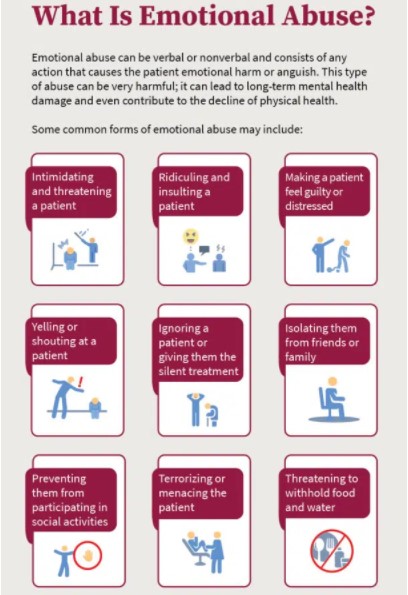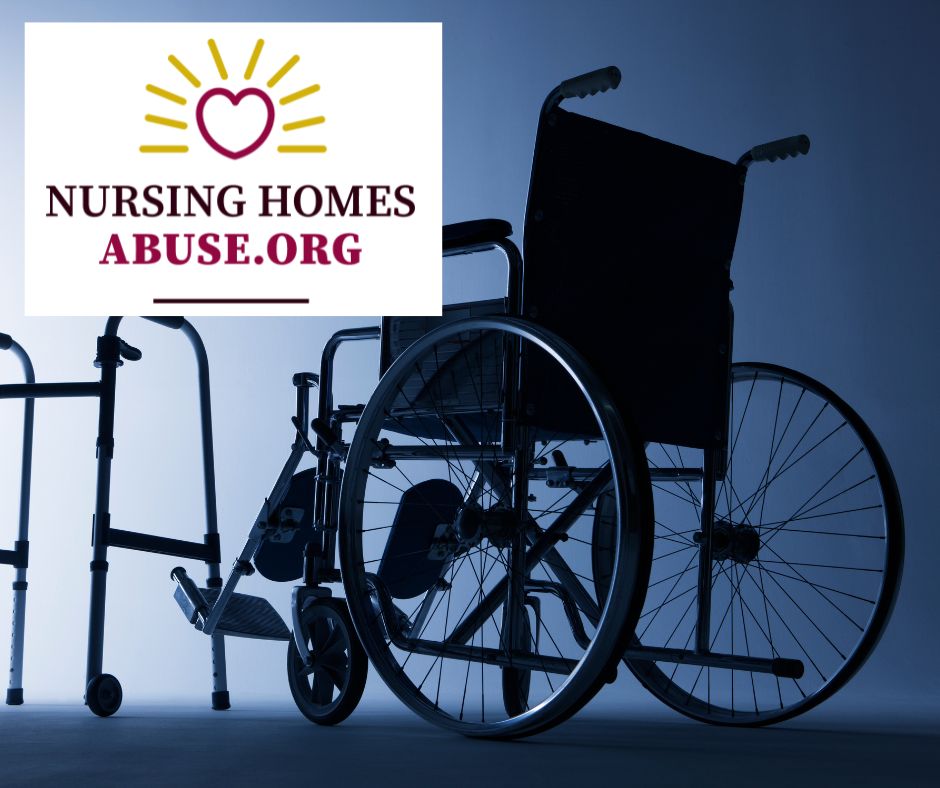Whether dealing with a loved one in a nursing home or it’s a personal sense of fear and confusion in a home yourself, there are signs of abuse to identify and steps to help
Shared with permission by the Online Advocacy Group, Nursing Home Abuse.org
Elder abuse is a blanket term for any knowing, intentional, or negligent act that causes or risks harm to a vulnerable adult. In this context, a vulnerable adult is an older individual who is functionally unable to care for themselves. An example of elder abuse would be hitting an elderly person, tricking a person with Alzheimer’s into changing their will, or leaving a bedbound individual to lie in their own bodily waste because you neglected to take them to the bathroom.
Sadly, elder abuse is quite common. It’s also not well understood, and many people think that physical abuse and sexual abuse are rare occurrence or that it only happens in subpar nursing home facilities.
About 1 in 10 adults in the U.S. have experienced elder abuse, but unfortunately, many people mistakenly think elder abuse is a rare or non-existent problem. Only about 1 in 24 cases of abuse are reported to the authorities. Many elders are too isolated to be able to report these crimes. Some may be embarrassed to admit that the abuse happened or may wish to protect the person responsible. Those with disabilities or other frailties may be more likely to experience mistreatment.
Signs of Physical Abuse
- Bruises, abrasions, welts, lacerations, or rope marks
- Head trauma or bone fractures
- Open wounds, cuts, punctures, or untreated injuries in various stages of healing
- Sprains, dislocations, and internal injuries or bleeding
- Bite, strangulation, or burn marks or other patterns of injury
- Signs of falls, including broken eyeglasses or frames
- Physical indications of punishment, such as evidence of physical restraints
- Medication overdose or chemical restraints
- Sudden behavioral changes

The Impact of Abuse
The impact of nursing home physical abuse on the elderly extends far beyond the pain that they experience. The overall effects of the abuse will vary based on factors such as the type of abuse suffered and the degree of abuse they experienced.
Like all forms of abuse, each elderly person may respond to abuse differently. Despite this, the risk of severe consequences is high and may come in the form of psychosocial consequences, physical trauma, increased hospitalization and mortality rates, depression, anxiety, and a decline in cognitive functioning.

Symptoms of Emotional Abuse
- Depression and withdrawal
- Refusal to interact or speak with others
- Sudden change in personality or behavior
- Agitation
- Excessive fear or nervousness
- Unusual behavior such as sucking, biting, or rocking
If the abuse continues, physical symptoms may begin to manifest. These can include:
- Loss of appetite
- Lack of sleep or insomnia
- Sudden weight loss
- Refusal to eat or take medications
- Increased vulnerability to injury and infection
A survey conducted by the National Center on Elder Abuse found that 33.4% of nursing home residents experienced emotional abuse within the past year. If you witness an elderly person exhibiting these symptoms, notify an independent party who can assist with making sure they receive the care they need.
In this article, we’ve reviewed physical and emotional abuse. Regarding other types of abuse, here are related articles to consider: Abandonment | Verbal Abuse | Sexual Abuse.
What do I do if I suspect nursing home abuse? If you are a family member of a resident suffering from possible abuse, you must take action to ensure that your loved one remains safe.
Regardless of which type of abuse you suspect is taking place, no form of abuse is acceptable, and there are resources available to help you and your loved one. Elders deserve a safe and comfortable living environment where they are free to enjoy their lives without fear of physical abuse.

If you need help, consider the following suggestions to get your loved one out of harm’s way:
- File a report directly with the nursing facility about the staff member or other resident in question
- Seek medical attention for any injuries that the elderly person has suffered as a result of the abuse at a hospital or facility
- Contact the police and file a police report
- Reach out to Adult Protective Services and express your concerns about the nursing home facility
- Contact your state’s office of the Administration on Aging, which administers the Long-Term Care Ombudsman Program
- Contact a lawyer
- Seek other resources that may be needed to help your loved one through the healing process, such as mental health professionals
If abuse seems to be severe or continuous, it is important to report it, document it and give details of signs and patterns to the nursing home administration.
If nothing changes, reach out to your state government for assistance. They have nursing home abuse advocates who work on behalf of elderly individuals who are residents in nursing homes or other similar facilities.
The Administration of Aging oversees the Long-Care Ombudsman Program. You can find the contact information for your state through the Consumer Voice website.
Helping the countless nursing home residents who have suffered abuse and neglect

At NursingHomesAbuse.org, our mission is to help the countless nursing home residents who have suffered abuse and neglect by those entrusted with their care. Abuse of senior citizens in nursing homes and assisted living facilities is widespread and often goes unreported.
We provide education and resources for seniors and their loved ones as part of a larger effort to stop the cycle of neglect and abuse that has reached epidemic levels in nursing homes and other care facilities across the country.
NursingHomesAbuse.org exists to inform families about the risks of nursing home abuse, and helps people take legal action if a loved one has been injured.